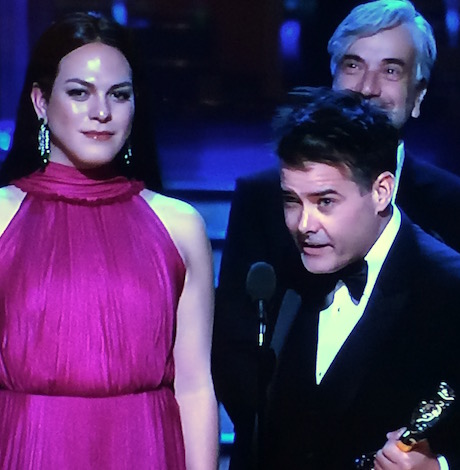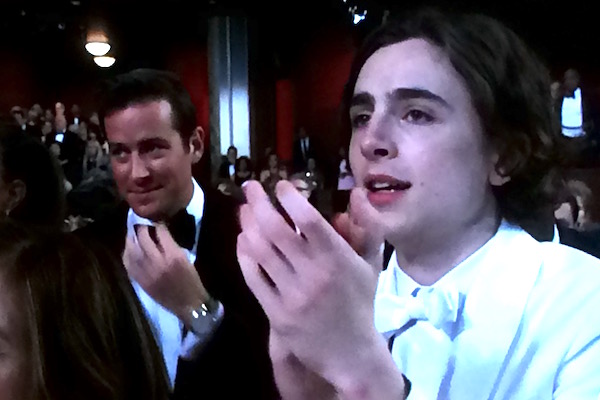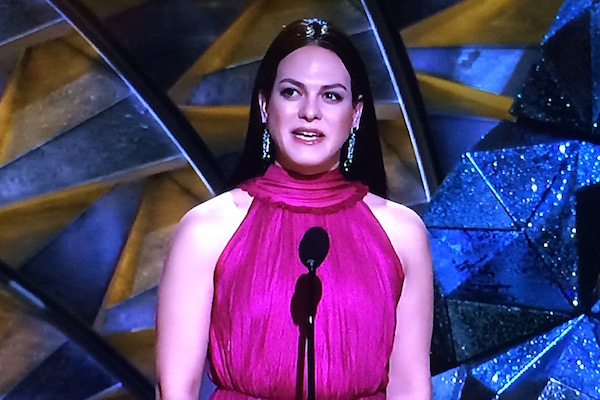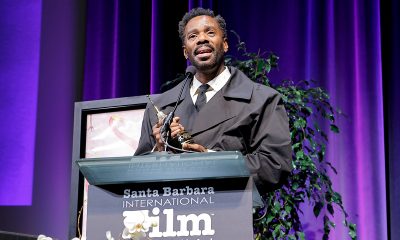Arts & Entertainment
LGBT representation strong at 90th annual Academy Awards
Screenwriter James Ivory accepts ‘Call Me By Your Name’ award; ‘Fantastic Woman’ wins foreign language prize

Despite a bloated presentation that clocked in at almost four hours, the telecast of the 90th Academy Awards had some spectacular moments, especially for LGBT movie fans.
The big moment came when “A Fantastic Woman” won the award for Best Foreign Language Film, the first Oscar win for he country of Chile. Directed by Sebastián Leilo, the movie centers on Marina Vidal (Daniela Vega), a trans woman who is kicked out of her apartment when her boyfriend suddenly dies. Vega’s moving performance marked a cinematic milestone—a trans woman being payed by a trans actress in a mainstream movie.
The award was presented by veteran actress and LGBT icon Rita Moreno (now appearing in the Netflix reboot of the classic sitcom “One Day at a Time” which now features a lesbian character and is set in a Cuban-American household). In the most fabulous entrance of the evening, Moreno strutted to the microphone wearing the same dress she wore to accept her Academy Award for “West Side Story.”
Vega made even more cinematic history when she became the first openly trans person to be a presenter on the Oscar stage (appropriately enough, she introduced Sufjan Steven’s performance of his song “The Mystery of Love” from “Call Me By Your Name”). She acknowledged the importance of her appearance on the Oscar stage, saying, “Thank you so much for this moment.” She also encouraged the audience to “open your heart to love.”
Sadly, the trans director Yance Ford did not win for his documentary “Strong Island.”
Openly gay screenwriter James Ivory (“Maurice”) also made Oscar history when he accepted the prize for Best Adapted Screenplay for “Call Me By Your Name,” the only award for the film. The 89-year old Ivory became the oldest person to win an Academy Award. In a touching speech he mentioned his late collaborators Ismail Merchant (who was also his life partner) and Ruth Prawer Jhabvala.
In another noteworthy development, after Disney’s “Coco” won the award for Best Animated Feature, no one commented when two members of the creative team (producer Darla K. Anderson and co-writer and co-director Adrian Molina) thanked their same-sex spouses. In the past, such declarations of LGBT love would have made headlines.
In addition, “Coco” director Lee Unkrich underscored a major theme of the evening when he said, “Marginalized people deserve to feel like they belong. Representation matters!”
Perhaps this means Tio Oscar and Tio Felipe were a gay couple after all.
“Coco’s” lovely ballad “Remember Me” took home the Oscar for Best Original Song, beating out the power ballad “This Is Me” from “The Greatest Showman” written by the gay-straight duo of Benj Pasek and Justin Paul. During the ceremony, “This Is Me” (which will undoubtedly be performed at every Pride celebration this summer) was given a powerhouse performance by cast member Keala Settle. Settle also appeared in a commercial for Walmart that was actually part of the ceremony.
“The Shape of Water,” a queer celebration of community and resistance, was nominated for 13 Oscars (the most nominations this year) and won four: Best Picture, Best Director (Guillermo del Toro), Best Score for Alexandre Desplat and Best Production Design. Richard Jenkins, who played the heroine’s next-door neighbor and gay best friend did not win, nor did his co-stars Octavia Spencer and Sally Hawkins.
While the creative team behind “The Shape of Water” gathered the most statues, no movie dominated the evening. “Dunkirk,” “The Darkest Hour” and “Blade Runner 2049” won several of the design awards (and Gary Oldman won Best Actor for his portrayal of Winston Churchill in “The Darkest Hour”). Not surprisingly, Mark Bridges won Best Costume Design for his sumptuous couture designs in “Phantom Thread.”
And in an unexpected moment, a very surprised Jordan Peele won Best Original Screenplay for his powerful horror film, “Get Out.”

ARMIE HAMMER and TIMOTHEE CHALAMET at the Academy Awards Sunday night. (screen capture courtesy ABC)
“Three Billboards Outside Ebbing, Missouri” won acting honors for Frances McDormand (Best Actress) and Sam Rockwell (Best Supporting Actor). McDormand’s acceptance speech was a call to action. She asked all the women in the audience to stand and be recognized and she called on everyone to demand “inclusion riders” in their contracts. (Inclusion riders are clauses that require that film crews meet minimum diversity standards to retain the services of the artist.)
Several major movies surprisingly went home empty-handed, including: “Lady Bird,” “The Post” and “Mudbound,” which was directed by the ground-breaking Dee Rees, an out black lesbian.
In what may have been the funniest moment of the very long telecast filled with lame jokes, Mark Bridges (Best Costume Design) won the Jet Ski that host Jimmy Kimmel promised to the winner who gave the shortest acceptance speech, Bridges cam in at 38 seconds.
A full list of winners is here.
Television
ICYMI: ‘Overcompensating’ a surprisingly sweet queer treat
A sweet, savvy show about breaking free to embrace your true self

Pride month 2025 is now behind us, and while it’s safe to say that this year’s celebrations had a darker edge than usual, it’s also true that they came with a particularly rich bounty of new queer movies and shows to entertain us – so many, in fact, that even if we are facing a lull until the fall another harvest of fresh content, there are still plenty of titles – which, for whatever reason, were off your radar – for you to catch up on in the meantime.
One of the most notable of these – the bingeworthy series “Overcompensating” (now streaming on Amazon Prime) – will most definitely have been ON the radar for the plentiful fans of creator and star Benito Skinner, the actor/comedian who rose to viral fame through his content on platforms like Instagram, YouTube, and TikTok. For anyone else, it might have easily slipped through the cracks.
Created and written by Skinner as a loosely autobiographical “college comedy,” it aims for the kind of raucous, explicitly sexed-up tone one expects from the genre as it centers on Benny (Skinner), newly arrived as a freshman at prestigious Yates University. A former football jock and “golden boy” at his midwestern high school, he’s the picture of idealized youthful masculinity; he’s also deep in the closet, struggling to keep his sexuality hidden and maintain his macho front under the intense scrutiny of the college’s social scene – and under the resentful eye of his older sister Grace (Mary Beth Barone), who has already secured her own place at the top of the pecking order.
In the first episode, Benny’s difficulties are eased when he meets Carmen (Wally Baram), another freshman trying to navigate the politics of college life; a gamer from a home marred by tragedy, she’s an outsider who feels like she’s putting on an act, too, and they click – giving him the convenient “cover” of female companionship while providing them both with much-needed support and encouragement. He’s also befriended by a handsome film major from England (Rish Shah), who has already caught his eye, stirring other kinds of feelings and possibly even reciprocating them. Meanwhile, he’s being courted by the school’s “exclusive secret society” – headed by his sister’s aggressively “alpha” boyfriend Pete (Adam DiMarco) – and trying to stay interested in his studies, despite a growing realization that a career in business doesn’t actually appeal to him all that much.
That’s a lot to juggle for anybody, even an overachiever like Benny – whose “lucky” life so far has largely been the result of playing a role he is finding harder and harder to maintain. As the series goes on through its eight-episode arc, it becomes clear that he’s not the only one who is “keeping up appearances,” and he, along with the other confused and damaged young people in his orbit, begins the painful (but often hilarious) process of evolution that is required in order to become truly oneself.
Directed toward appealing to a younger demographic, “Overcompensating” is the kind of show that requires a few episodes worth of invested time to make an impression that feels like substance. Full of the bawdy farcical antics that go hand in hand with stories about hormonally charged college kids, it’s not above leaning into the formulas and tropes that have always driven these kinds of comedies. At first, while its broadly comedic strokes and frequently explicit sexual hijinks might elicit plenty of chuckles, the show might easily feel tiresome for more mature audiences; there’s a nostalgic fun to it, made even more appealing, somehow, by the “political incorrectness” of its frequently sexist and homophobic humor, but for a while things may feel like an unnecessary attempt to reinvent “Animal House” for the Gen Z crowd.
By the time the season reaches its halfway point, however, things have started to get real. The antics of these horny almost-adults take on a more pointed absurdity, informed by the increasingly tangled web of defensive deceit they weave among themselves – and, as things draw toward a cliffhanger climax, the consequences of maintaining it – until it achieves a sense of empathy toward them all. There’s a wisdom that smacks of lived authenticity underlying the whole affair, transforming it from the “sexploitative” teen comedy of its surface into something deeper. To be sure, things stay expectedly wacky, and the soap-operatic melodrama of its twists and reversals continue to maintain the show’s “mature YA” appeal; but beneath those trappings, by the end of the season a truer identity has begun to emerge, just as its characters have begun to find their own levels of self-actualization for themselves.
As creator, primary writer, and star, it’s obviously Skinner who deserves much of the credit. While it might be tempting, early on, to dismiss the show as an “ego project,” the internet-spawned sensation proves his talents quickly enough to get past such judgy suspicions, delivering a pitch-perfect blend of sauciness and sensitivity that extends its appeal toward both ends of the taste spectrum; just as crucially, he brings the same aforementioned “lived authenticity” to his winning performance – after all, he’s essentially playing himself in a fictionalized version of his own life – while also making sure that equal time (and compassion) is afforded all the other characters around him, each of whom are pushing at the boundaries of their own respective “closets,” too. It’s unavoidable to notice that – like most of his co-stars – he’s plainly a decade too old to be playing a college student; but by the time we reach that crucial halfway turning point, we’ve become too engaged by him to care.
The show is full of excellent performances, in fact. Relative newcomers Baram and Barone offer layers of complex nuance, while the more familiar DiMarco (“White Lotus”) is close to heartbreaking as the toxic BMOC clinging to the illusion of power as his life begins unraveling around him. Other standouts include the mononymic actress Holmes as Carmen’s “wild child” roommate, solidly likable turns as Benny’s parents from mature veterans Connie Britten and Kyle MacLachlan (whose presence, along with stylish elements in several key scenes, hints at an homage-ish nod to the late David Lynch), and podcaster Owen Thiele as an openly gay fellow student who has Benny “clocked” from the moment they meet. Finally, Lukas Gage makes a deep impression as a former high school teammate at the heart of Benny’s most haunting memory.
There’s no official word yet on whether “Overcompensating” will be renewed for a second season, despite the multiple loose ends left dangling at the end of its first; it has proven to be popular, and Skinner’s large fanbase makes it likely that the story will continue. Even if it doesn’t, the place of uncertainty in which it has left its characters rings true enough to serve as a satisfying endpoint.
As for us, we hope that won’t happen. For all its sophomoric humor, generic plot twists, and purposefully gratuitous sexual titillation, it’s one of the sweetest, kindest, and most savvy shows we’ve seen about breaking free from conformity to embrace your true self – and that’s a message that applies whether you’re queer, straight, or anywhere in between.
Photos
PHOTOS: Independence Day Weekend in Rehoboth
Wicked Green Pool Party, fireworks among festivities

Vacationers and residents alike enjoyed Independence Day Weekend activities in Rehoboth Beach, Del. The Wicked Green Pool Party drew hundreds to the CAMP Rehoboth fundraiser on Saturday. That evening, revelers went to the rooftops to watch the fireworks display.
(Washington Blade photos by Daniel Truitt)













Music & Concerts
Red, White, and Beyoncé: Queen Bey takes Cowboy Carter to D.C. for the Fourth of July
The legendary music icon performed on July 4 and 7 to a nearly sold-out Northwest Stadium.

Just in time for Independence Day, Beyoncé lit up Landover’s Commanders Field (formerly FedEx Field) with fireworks and fiery patriotism, bringing her deeply moving and genre-defying “Cowboy Carter” tour to the Washington, D.C. area.
The tour, which takes the global icon across nine cities in support of her chart-topping and Grammy-winning country album “Cowboy Carter,” landed in Prince George’s County, Maryland, over the Fourth of July weekend. From the moment Beyoncé stepped on stage, it was clear this was more than just a concert — it was a reclamation.
Drawing from classic Americana, sharp political commentary, and a reimagined vision of country music, the show served as a powerful reminder of how Black Americans — especially Black women — have long been overlooked in spaces they helped create. “Cowboy Carter” released in March 2024, is the second act in Beyoncé’s genre-traversing trilogy. With it, she became the first Black woman to win a Grammy for Best Country Album and also took home the coveted Album of the Year.
The record examines the Black American experience through the lens of country music, grappling with the tension between the mythology of the American Dream and the lived realities of those historically excluded from it. That theme comes alive in the show’s opening number, “American Requiem,” where Beyoncé sings:
“Said I wouldn’t saddle up, but
If that ain’t country, tell me, what is?
Plant my bare feet on solid ground for years
They don’t, don’t know how hard I had to fight for this
When I sing my song…”
Throughout the performance, Beyoncé incorporated arresting visuals: Black cowboys on horseback, vintage American iconography, and Fox News clips criticizing her genre shift — all woven together with voiceovers from country legends like Dolly Parton and Willie Nelson. The result was a multimedia masterclass in storytelling and subversion.
The “Cowboy Carter” tour has been a social media sensation for weeks, with fans scrambling for tickets, curating elaborate “cowboy couture” outfits, and tailgating under the summer sun. At Commanders Field, thousands waited in long lines for exclusive merch and even longer ones to enter the stadium — a pilgrimage that, for many, felt more like attending church than a concert.
One group out in full force for the concert was Black queer men — some rocking “denim on denim on denim on denim,” while others opted for more polished Cowboy Couture looks. The celebration of Black identity within Americana was ever-present, making the concert feel like the world’s biggest gay country-western club.
A standout moment of the night was the appearance of Beyoncé’s 13-year-old daughter, Blue Ivy Carter. Commanding the stage with poise and power, she matched the intensity and choreography of her mother and the professional dancers — a remarkable feat for someone her age and a clear sign that the Carter legacy continues to shine.
It’s been nearly two decades since Beyoncé and Destiny’s Child parted ways, and since then, she’s more than lived up to her title as the voice of a generation. With “Cowboy Carter,” she’s not just making music — she’s rewriting history and reclaiming the space Black artists have always deserved in the country canon.
-

 Federal Government2 days ago
Federal Government2 days agoTreasury Department has a gay secretary but LGBTQ staff are under siege
-

 Virginia3 days ago
Virginia3 days agoDefying trends, new LGBTQ center opens in rural Winchester, Va.
-

 District of Columbia2 days ago
District of Columbia2 days agoGay GOP group hosts Ernst, 3 House members — all of whom oppose Equality Act
-

 Opinions4 days ago
Opinions4 days agoUSAID’s demise: America’s global betrayal of trust with LGBTQ people













